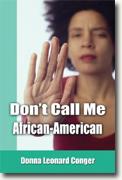Donna Leonard Conger
book reviews:
· general fiction
· chick lit/romance
· sci-fi/fantasy
· graphic novels
· nonfiction
· audio books
· author interviews
· children's books @
curledupkids.com
· DVD reviews @
curledupdvd.com
newsletter
win books
buy online
links
home
for authors
& publishers
for reviewers

 |
Don't Call Me African-American Donna Leonard Conger PublishAmerica Paperback 96 pages November 2003 |
|
Donna Leonard Conger is an angry, passionate woman and doesn’t care who knows it. In this small book, part poetry, part memoir, part diatribe, she tells her life like it was.
Her life history has much in it that any woman could identify with – a domineering mother, father’s death at an early age, the need to please men to an excessive degree, and a painful battle to carve out her identity and find a man who would love her for being that. Conger characterizes her mother as "wrathful" and herself as eager to appease her and divert her anger, saying "I was a highly nervous child." It was partly this constant struggle with her mother’s deficiencies that helped her to develop a sense of self: "I had to deal with my prejudices. I had to learn to ignore the taunting labels of other blacks who had everything figured out, including how I should act according to the color of my skin."She was dismayed to find out that, by taking a stand, she caused other blacks to suspect her of being ashamed of her race, whereas she believes she is merely being realistic about the problems, weaknesses and strengths of her black sisters and brothers. She complains that whites want a black person to act in a way that they can be comfortable with, while blacks expect other blacks to be quintessentially black. She compares this racial stress to a real war, one in which she has been called to fight even as she would rather get on with her own life. "How I defined myself as a brown-skinned human in a world of light-skinned humans was irrelevant to me," she says. Don't Call Me African-American recounts the author’s struggles with men, including her belief that she could "reform" her first husband and cure his homosexuality, somehow making him strong by being stronger herself. She is honest about her pain, her failed relationships, and the love she finally found with a man who "did not intrude on me." She reminisces about her grandparents, Alabama farmers and strictly moral. Her upbringing led her to befriend whites who, like her, spoke clearly and didn’t make prejudicial remarks. Her black associates considered her an "Uncle Tom" and told her so. For a long time, nearly forty years, Conger was angry and unsettled. Finally she came to grips with her difference of opinion with her fellow blacks, and wrote this book to vent her frustrations and give voice to her struggle to become a person outside the racial box. It is also a joyous victory cry, as she has attained personal goals: "I am human first, and that’s where my efforts have gone." Conger forthrightly asserts, "A strong, balanced self-identity started at my own family roots, not the mass of African and black American roots worldwide… I cannot blame white masters for the heinous, unspeakable crimes they levied against the black race as early as a century ago. I cannot because it did not happen to me personally." This is a concept that many blacks and some whites as well will consider perplexing and challenging. The book ends with the genteel expression of someone who has had her say, and had it completely: "Thanks for letting me finish my thought." Don’t Call Me African-American is a product of PublishAmerica, a print-on-demand publishing house which is making it easier for unpublished or lesser-known authors to get a book circulating in the big wide world without having to pay for the privilege. This reviewer commends both author and publisher for this successful collaboration.
|
|
|
|
 Click here to learn more about this month's sponsor! |
|
| fiction · sf/f · comic books · nonfiction · audio newsletter · free book contest · buy books online review index · links · · authors & publishers reviewers |
|
| site by ELBO Computing Resources, Inc. | |
 Author of five romance novels and many magazine pieces, Conger bases her book’s title on the words of Whoopi Goldberg: "Rosa Parks did not sit on that bus so that I could put something in front of the word American. She sat on that bus to remind people that we are all entitled to the same thing." Conger wants to be understood and judged for who she is, not as a stereotype. If this insistence is politically incorrect, she makes no apology.
Author of five romance novels and many magazine pieces, Conger bases her book’s title on the words of Whoopi Goldberg: "Rosa Parks did not sit on that bus so that I could put something in front of the word American. She sat on that bus to remind people that we are all entitled to the same thing." Conger wants to be understood and judged for who she is, not as a stereotype. If this insistence is politically incorrect, she makes no apology.